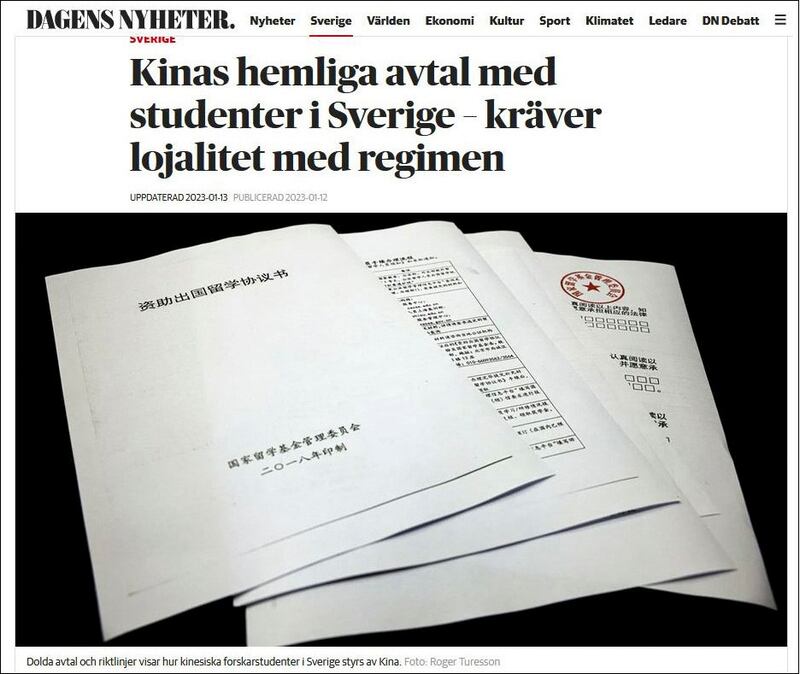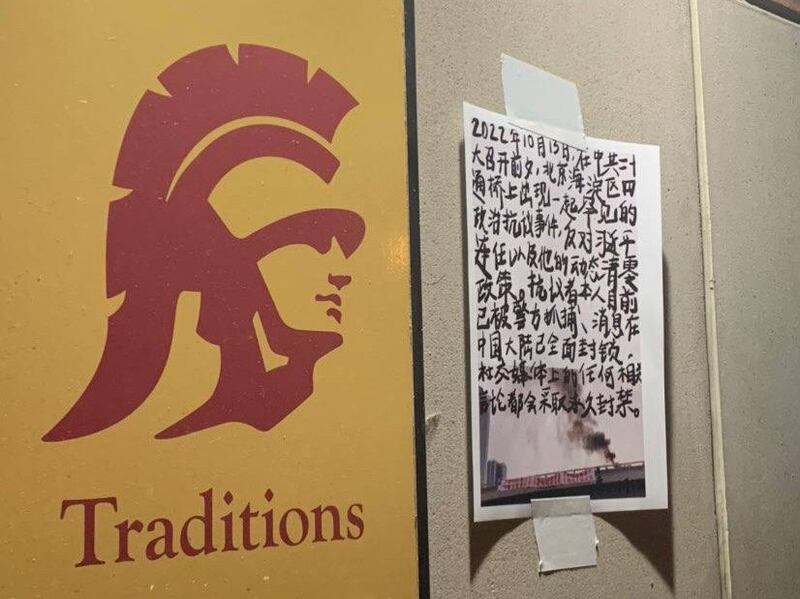Tens of thousands of Chinese students studying overseas on government-backed scholarships are required to sign a document pledging loyalty to the ruling Communist Party, as well as putting up guarantors who could be forced to repay their funding should they break the agreement, before arriving at overseas universities, Radio Free Asia has learned.
Sweden's Dagens Nyheter newspaper reported on Jan. 13 that 30 doctoral students arriving in the country had signed contracts pledging loyalty to their government while overseas, and requiring them to serve China's interests during their stay.
A review of publicly available documents by Radio Free Asia found evidence that this practice has been going on quietly for more than a decade, with several versions of the contract and related regulations freely available online.
"During your time studying abroad, you must hone your sense of responsibility and your ability to follow orders, and not engage in any activities that could harm your country's interests or national security," the contract states.
"You must consciously protect the honor of the motherland and of your school, and abide by both the laws of China and the country where you are studying," it says.
Students must also provide the names of two guarantors who countersign the document, in case a student fails to report to the local Chinese embassy or otherwise breaks the terms of the agreement, the documents reveal.
Anyone who tries to resign from their scholarship without authorization or who "behaves extremely badly," or who just disappears or moves to another country or school without authorization will trigger the repayment of around one third of their funding by their guarantors, they show.
Conditional on loyalty
China had said it would send 27,000 students to study overseas on public money for all of 2021, and that their scholarships were entirely conditional on their party loyalty, including a pledge to "come back and serve their country" on completion of their studies, according to another publicly available document.
Anyone who has received funding from any overseas institution or holds permanent residency in another country is automatically disqualified, according to 2021 scholarship selection guidelines posted to the website of the Chinese Embassy in the United Kingdom.
Applicants must be able to show that they "support the leadership of the Chinese Communist Party ... and have a sense of duty to serve their country, with a correct world view and values," the document said.
"Selecting organizations shall strictly check applicants' political ideology, their teachers' morality, conduct and learning approach," it said, adding that there will also be a "contractual management method" for recipients of state funding that includes "compensation for breach of contract."
According to the Dagens Nyheter report, students had to produce a "guarantor, who is usually a close relative" who would be held liable if the student broke the terms of the agreement.
According to a version of the rules posted to the website of the China Scholarship Council, two guarantors are required for every application who "have the ability to pay off [debts] on behalf of others."

“The scope of guarantee includes compensation and damages to be paid to the China Scholarship Council in the event of a violation of the agreement by the overseas student," they say, adding that guarantors will be asked to repay no more than 30% of the funds already disbursed by the council.
Guarantors must have personal assets or a stable income enabling them to pay this.
U.S.-based dissident Jie Lijian said it's not just family members who pay a price if a student breaks the contract, however.
"Your university lecturers, the people who recommended you, and your university will all bear joint responsibility ... which is tantamount to a joint punishment mechanism," Jie said.
He said overseas Chinese associations, student alumni associations, and hometown associations in each school also monitor each other's words and deeds, as well as leading political activities.
For example, if Chinese officials or delegations visit the area, there will be funding to arrange clothing, food, housing, transportation, banners and posters to welcome them, Jie said, with rehearsals of slogan-shouting and close monitoring of each individual's performance at the event.
Dates back to the 1990s
Sweden-based writer Wan Zhi said that while many had been shocked at the newspaper's revelations, similar practices date back to the 1990s in China.
"This has always been the Communist Party's trick," Wan said. "The West is actually pretty ignorant of China's culture, society and political system and they still don't understand the relationship between individuals and the state in China."
"If you take public money in China, you are one of them, and you are theirs, the party's," he said. "One positive thing to come out of these media reports is that the West has finally opened its eyes a little bit, so the public can see things they never saw before."
He said that even privately funded students can face dire consequences if they engage in political activism while overseas.
"You will still be punished ... if you take part in political activities and it will affect your family," Wan said.

Jie agreed, citing the behavior of overseas students in the wake of Peng Lifa's "Bridge Man" protest in Beijing on the eve of the 20th party congress in October, which some Chinese students supported with poster campaigns on U.S. campuses.
"They tore up posters at USC and Irvine, and then reported back immediately to the group chat showing off that they had done so," he said. "They also reported which part of China the [poster makers] were from and accused them of endangering national security."
"They have a sense of pride in being able to report these rebels to the Chinese police on Weibo, so they can arrest them on their return to China."
Families could become hostages
Independent director and current affairs commentator Wang Longmeng said it is still worth understanding the practical meaning of phrases like "serving your country" and "loyalty to the Chinese Communist Party," even if the practice has been going on for years.
"The Western media have reported many cases of Chinese students and scholars stealing high-tech military technologies, and besieging protesters who supported Hong Kong's anti-extradition protests," Wang said. "A lot of people who have been awarded Chinese government scholarships to study abroad have basically been recruited by the state, and these agreements are the best proof of that."
He likened the contracts to "selling one's soul to the devil."
"Their families are destined to become hostages," he said. "Universities in democratic countries should refuse to cooperate with institutions like the China Scholarship Council, otherwise they will become accomplices in that hostage-taking."
The scandal has already had some repercussions in Sweden, with Uppsala and Lund Universities saying they will terminate cooperation with the China Scholarship Council, and the Royal Institute of Technology saying they were "in discussions" with the council on the matter.
Meanwhile, faculty at the Center for East Asian Studies at the University of Chicago have called for the release of alumna Qin Ziyi, who was among dozens of young people detained in the wake of the November 2022 "white paper" movement.
"[We] are aware that people, including a former student of the University of Chicago, have recently been detained in China due to their participation in peaceful protests where people held blank sheets of paper to express dissent to the government’s Zero Covid policy," the department said in a statement on its website.
"We express our deep concern for the well-being of Qin Ziyi and all those who have been detained and hope they will speedily be released," it said.
Translated by Luisetta Mudie. Edited by Malcolm Foster.
